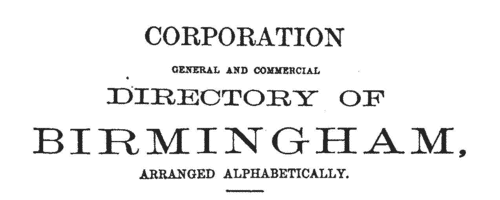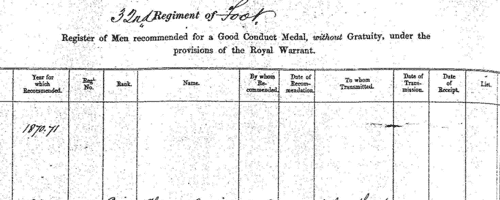Bees Surname Ancestry ResultsOur indexes 1000-1999 include entries for the spelling 'bees'. In the period you have requested, we have the following 52 records (displaying 21 to 30): Single Surname Subscription | | | Buying all 52 results of this search individually would cost £294.00. But you can have free access to all 52 records for a year, to view, to save and print, for £100. Save £194.00. More... |
These sample scans are from the original record. You will get scans of the full pages or articles where the surname you searched for has been found. Your web browser may prevent the sample windows from opening; in this case please change your browser settings to allow pop-up windows from this site. Long-stay Paupers in Workhouses: Bedminster
(1861)
This comprehensive return by the Poor Law Board for England and Wales in July 1861 revealed that of the 67,800 paupers aged 16 or over, exclusive of vagrants, then in the Board's workhouses, 14,216 (6,569 men, 7,647 women) had been inmates for a continuous period of five years and upwards. The return lists all these long-stay inmates from each of the 626 workhouses that had been existence for five years and more, giving full name; the amount of time that each had been in the workhouse (years and months); the reason assigned why the pauper in each case was unable to sustain himself or herself; and whether or not the pauper had been brought up in a district or workhouse school (very few had). The commonest reasons given for this long stay in the workhouse were: old age and infirm (3,331); infirm (2,565); idiot (1,565); weak mind (1,026); imbecile (997); and illness (493). BEES. Cost: £6.00.  | Sample scan, click to enlarge

| Long-stay Paupers in Workhouses: Paddington Parish
(1861)
This comprehensive return by the Poor Law Board for England and Wales in July 1861 revealed that of the 67,800 paupers aged 16 or over, exclusive of vagrants, then in the Board's workhouses, 14,216 (6,569 men, 7,647 women) had been inmates for a continuous period of five years and upwards. The return lists all these long-stay inmates from each of the 626 workhouses that had been existence for five years and more, giving full name; the amount of time that each had been in the workhouse (years and months); the reason assigned why the pauper in each case was unable to sustain himself or herself; and whether or not the pauper had been brought up in a district or workhouse school (very few had). The commonest reasons given for this long stay in the workhouse were: old age and infirm (3,331); infirm (2,565); idiot (1,565); weak mind (1,026); imbecile (997); and illness (493). BEES. Cost: £6.00.  | Sample scan, click to enlarge

| Long-stay Paupers in Workhouses: Stapleton, Bristol
(1861)
This comprehensive return by the Poor Law Board for England and Wales in July 1861 revealed that of the 67,800 paupers aged 16 or over, exclusive of vagrants, then in the Board's workhouses, 14,216 (6,569 men, 7,647 women) had been inmates for a continuous period of five years and upwards. The return lists all these long-stay inmates from each of the 626 workhouses that had been existence for five years and more, giving full name; the amount of time that each had been in the workhouse (years and months); the reason assigned why the pauper in each case was unable to sustain himself or herself; and whether or not the pauper had been brought up in a district or workhouse school (very few had). The commonest reasons given for this long stay in the workhouse were: old age and infirm (3,331); infirm (2,565); idiot (1,565); weak mind (1,026); imbecile (997); and illness (493). BEES. Cost: £6.00.  | Sample scan, click to enlarge

| Residents and Traders in Birmingham
(1861)
William Cornish's Corporation General and Trades Directory covered Birmingham, Coventry and the towns of the Black Country. The Birmingham section contains both street lists and this general alphabetical directory. BEES. Cost: £4.00.  | Sample scan, click to enlarge

|  Outstanding soldiers of the 101st (Royal Bengal Fusiliers) Regiment of Foot
(1870-1875) Outstanding soldiers of the 101st (Royal Bengal Fusiliers) Regiment of Foot
(1870-1875)
Each year just a handful of outstanding soldiers of the regiment were chosen for good conduct medals and gratuities: these are listed here. There were two lists, one for men recommended for the Good Conduct Medal without a gratuity, and one for gratuities - £5 to a private, £10 to a corporal, and £15 to a serjeant. Both lists are indexed here, and each gives rank, name, regimental number, date of recommendation and date of issue. (The sample scan is from the 32nd foot). BEES. Cost: £8.00.  | Sample scan, click to enlarge

| Private Residents of Birmingham and Suburbs
(1878)
The Post Office Directory of Birmingham with its Suburbs, edited by E. R. Kelly, and published in 1878, has two main alphabetical lists - Court and Commercial. The suburbs included are Aston, Bickenhill Park, Birchfield End, Castle Bromwich, Erdington, Saltley (with Washwood Heath), Ward End (including Little Bromwich) and Witton, in Warwickshire; Handsworth (with Soho), Harborne, Perry Barr and Smethwick, in Staffordshire; and King's Heath, King's Norton, Moseley, Northfield, Selly Oak and Yardley (including Hall Green and Stechford) in Worcestershire. The Court section, indexed here, lists nobility, gentry, clergy, and private residents in general.BEES. Cost: £4.00.  | Sample scan, click to enlarge

| Traders and Professionals in Birmingham and Suburbs
(1878)
The Post Office Directory of Birmingham with its Suburbs, edited by E. R. Kelly, and published in 1878, has two main alphabetical lists - Court and Commercial. The suburbs included are Aston, Bickenhill Park, Birchfield End, Castle Bromwich, Erdington, Saltley (with Washwood Heath), Ward End (including Little Bromwich) and Witton, in Warwickshire; Handsworth (with Soho), Harborne, Perry Barr and Smethwick, in Staffordshire; and King's Heath, King's Norton, Moseley, Northfield, Selly Oak and Yardley (including Hall Green and Stechford) in Worcestershire. The Commercial section, indexed here, lists all manner of traders, professional people and businesses.BEES. Cost: £4.00.  | Sample scan, click to enlarge

| Debtors
(1880)
County Court Judgments in England and WalesBEES. Cost: £6.00.  | Sample scan, click to enlarge

| Missing Next-of-Kin and Heirs-at-Law
(1880)
The Unclaimed Money Registry and Next-of-Kin Advertisement Office of F. H. Dougal & Co., on the Strand in London, published a comprehensive 'Index to Advertisements for Next of Kin, Heirs at Law, Legatees, &c., &c., who have been Advertised for to Claim Money and Property in Great Britain and all Parts of the World; also Annuitants, Shareholders, Intestates, Testators, Missing Friends, Creditors or their Representatives, Claimants, Unclaimed and Reclaimed Dividends and Stock, Citations, Administrations, Rewards for Certificates, Wills, Advertisements, &c., Claims, Unclaimed Balances, Packages, Addresses, Parish Clerks' Notices, Foreign Intestates, &c., &c.' The original list was compiled about 1860, but from materials dating back even into the 18th century: most of the references belong to 1850 to 1880. For each entry only a name is given, sometimes with a placename added in brackets: there may be a reference number, but there is no key by which the original advertisement may be traced. The enquirer of the time had to remit £1 for a 'Full and Authentic Copy of the Original Advertisement, together with name and date of newspaper in which the same appeared'. BEES. Cost: £4.00.  | Sample scan, click to enlarge

| Money lenders and other creditors
(1880)
Bills of sale transferred title in all property of a debtor to a specified creditor. Possession of a bill of sale thus protected a money lender or other creditor from losing a debtor's property to other creditors (except landlords) in case of insolvency or bankruptcy; and in many cases signing a bill of sale was a required step for a borrower securing a loan. The bill of sale specified the amount thereby secured, but could be open, i. e., allow for further drawings on the same account. Entries from the official register of bills of sales in England and Wales were published in Flint & Co.'s London Manchester and Dublin Mercantile Gazette, a weekly publication available only by subscription, issued under the motto "Security in Crediting". The entries are listed by county, then alphabetically by debtor, surname first, with address, trade, the name of the creditor ('in whose favour'), dates of issue and filing, and amount. An &c. after the amount indicates an open bill. The creditors that appear in the 'in whose favour' column are mainly, but not exclusively, loan companies and individual money lenders, and Jewish names figure prominently among the latter. When a loan was paid off, satisfaction of the bill of sale was entered on the register, and these satisfactions are also recorded in these pages. 1 January to 31 March 1880.BEES. Cost: £6.00.  | Sample scan, click to enlarge

|
Research your ancestry, family history, genealogy and one-name study by direct access to original records and archives indexed by surname.
|













